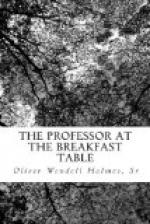But a willow will grow in baked sand wet with rainwater. An air-plant will grow by feeding on the winds. Nay, those huge forests that overspread great continents have built themselves up mainly from the air-currents with which they are always battling. The oak is but a foliated atmospheric crystal deposited from the aerial ocean that holds the future vegetable world in solution. The storm that tears its leaves has paid tribute to its strength, and it breasts the tornado clad in the spoils of a hundred hurricanes.
Poor little Iris! What had she in common with the great oak in the shadow of which we are losing sight of her?—She lived and grew like that,—this was all. The blue milk ran into her veins and filled them with thin, pure blood. Her skin was fair, with a faint tinge, such as the white rosebud shows before it opens. The doctor who had attended her father was afraid her aunt would hardly be able to “raise” her,—“delicate child,”—hoped she was not consumptive,—thought there was a fair chance she would take after her father.
A very forlorn-looking person, dressed in black, with a white neckcloth, sent her a memoir of a child who died at the age of two years and eleven months, after having fully indorsed all the doctrines of the particular persuasion to which he not only belonged himself, but thought it very shameful that everybody else did not belong. What with foreboding looks and dreary death-bed stories, it was a wonder the child made out to live through it. It saddened her early years, of course,—it distressed her tender soul with thoughts which, as they cannot be fully taken in, should be sparingly used as instruments of torture to break down the natural cheerfulness of a healthy child, or, what is infinitely worse, to cheat a dying one out of the kind illusions with which the Father of All has strewed its downward path.
The child would have died, no doubt, and, if properly managed, might have added another to the long catalogue of wasting children who have been as cruelly played upon by spiritual physiologists, often with the best intentions, as ever the subject of a rare disease by the curious students of science.
Fortunately for her, however, a wise instinct had guided the late Latin tutor in the selection of the partner of his life, and the future mother of his child. The deceased tutoress was a tranquil, smooth woman, easily nourished, as such people are,—a quality which is inestimable in a tutor’s wife,—and so it happened that the daughter inherited enough vitality from the mother to live through childhood and infancy and fight her way towards womanhood, in spite of the tendencies she derived from her other parent.
—Two and two do not always make four, in this matter of hereditary descent of qualities. Sometimes they make three, and sometimes five. It seems as if the parental traits at one time showed separate, at another blended,—that occasionally, the force of two natures is represented in the derivative one by a diagonal of greater value than either original line of living movement,—that sometimes there is a loss of vitality hardly to be accounted for, and again a forward impulse of variable intensity in some new and unforeseen direction.




